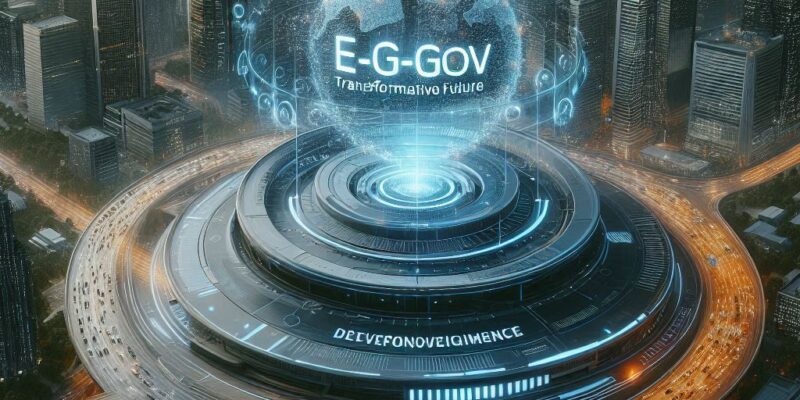
The concept of e-governance, the utilization of technology to deliver government services, has revolutionized citizen interaction with public administration. From online permit applications to tax filing, e-governance has streamlined processes and enhanced accessibility. However, with the ever-increasing volume and variety of data generated by citizen interactions, governments require advanced solutions to unlock the true potential of e-governance. This is where cutting-edge data intelligence comes into play.
Data intelligence refers to the processes and technologies used to extract valuable insights from data. By leveraging these advancements, governments can significantly improve e-governance services, leading to a more efficient, citizen-centric experience. Let’s delve into some of the most promising developments in data intelligence and explore their impact on e-governance.
- Artificial Intelligence (AI) and Machine Learning (ML): AI and ML algorithms are transforming the way governments analyze citizen data. These algorithms can identify patterns, predict trends, and automate tasks, leading to several benefits:
- Personalized Services: AI can personalize the e-governance experience by tailoring information and services to individual citizen needs. Imagine a system that recommends relevant government programs based on a citizen’s profile or proactively alerts them to upcoming deadlines for permit renewals.
- Proactive Governance: ML algorithms can analyze data to predict potential issues, enabling governments to take preventive action. For instance, analyzing traffic data can help predict congestion hotspots, allowing for dynamic traffic management strategies.
- Fraud Detection: AI can be used to analyze vast amounts of data to identify fraudulent activity in areas like welfare programs or tax filings. A study by IBM found that AI-powered fraud detection can save governments billions of dollars annually.
- Natural Language Processing (NLP): NLP allows machines to understand and process human language. This technology is revolutionizing e-governance by enabling:
- Chatbots and Virtual Assistants: NLP can power chatbots and virtual assistants that provide citizens with 24/7 access to information and services. These chatbots can answer frequently asked questions, schedule appointments, and even guide citizens through complex processes.
- Sentiment Analysis: NLP can analyze citizen feedback on government services, providing valuable insights into public satisfaction and areas for improvement. This allows governments to be more responsive to citizen needs and improve service delivery.
- Big Data Analytics: The ability to collect, store, and analyze vast datasets (big data) opens doors for improved e-governance:
- Data-Driven Decision Making: By analyzing large datasets, governments can make informed decisions based on real-world data rather than relying solely on intuition. This data-driven approach can optimize resource allocation, improve service delivery efficiency, and ultimately lead to better outcomes.
- Performance Monitoring: Big data analytics allows for real-time monitoring of key performance indicators (KPIs) for various government services. This enables proactive identification of issues and facilitates continuous improvement of e-governance platforms.
Unlocking the Potential: Data Intelligence for a More Effective E-Governance Ecosystem
While the potential of data intelligence for e-governance is clear, successful implementation requires careful consideration of several factors:
- Data Security and Privacy: Citizen data privacy is paramount. Governments must ensure robust data security measures are in place to build trust and encourage citizen participation.
- Data Quality: The effectiveness of data intelligence hinges on high-quality data. Governments need to establish robust data collection and management practices to ensure the accuracy and completeness of their data sets.
- Skilled Workforce: Implementing and utilizing data intelligence solutions requires a skilled workforce with expertise in data analysis, AI, and related technologies.
How P99Soft Can Help
Companies like P99Soft, with expertise in banks and insurance, can be instrumental in helping governments navigate the complexities of data-driven e-governance. By providing services like data collection, cleaning, analysis, and visualization, P99Soft can empower governments to unlock the valuable insights hidden within their data and leverage them to improve services for citizens.
Citizen Engagement: A Crucial Piece of the Puzzle
The success of any e-governance initiative hinges on citizen engagement. Governments must effectively communicate the benefits of data intelligence and assure citizens that their data privacy is protected. Additionally, involving citizens in the design and development of e-governance services can lead to more user-friendly and effective platforms.
FAQs
- Is data intelligence secure?
Data security is a top priority when implementing data intelligence solutions. Governments should prioritize robust cybersecurity measures and adhere to strict data privacy regulations.
- What are the ethical considerations of using data intelligence in e-governance?
Transparency and accountability are crucial. Citizens should be informed about how their data is collected, used, and protected. Additionally, AI algorithms used in e-governance should be free from bias.
Conclusion
The advancements in data intelligence offer a transformative opportunity to revolutionize e-governance. By leveraging AI, NLP, and big data analytics, governments can personalize services, predict citizen needs, and make data-driven decisions for a more effective and efficient public administration. However, successful implementation requires careful consideration of data security, privacy, and the need for a skilled workforce. Citizen engagement is also crucial for building trust and ensuring the long-term success of data-driven e-governance initiatives.
As we move forward, the question remains: how can governments best harness the power of data intelligence to create a future where e-governance services are not just efficient, but truly citizen-centric?
Also know Unleashing the Power of Victron Lithium Battery Technology










